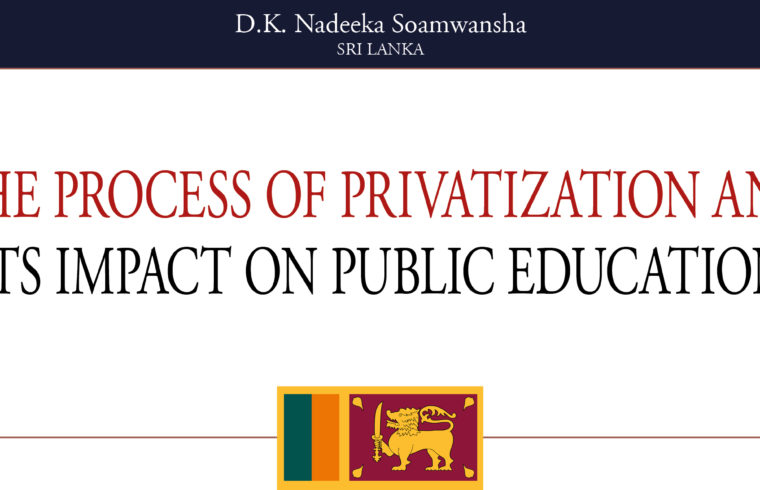D.K. Nadeeka Soamwansha
SRI LANKA
Privatization is a process, which can be defined as the “transfer of assets, management, functions or responsibilities previously owned or carried out by the state to private sectors”.
There are many different ways in privatization can occur. Additionally, the unmonitored and unregulated expansion of private sector provision of education, such as for profit schools or low fee private schools, may have a privatizing effect if students have no other choice of school.
Across the world, there is a growing trend towards allowing private institutions to become active players in the development and delivery of social programs.
The private sector has always been involved in education, with family religious institutions and philanthropic organizations playing an important role in its funding and governance.
Privatization of education happens if the state allows and encourages the participation of the private sector for the supply of public education services.
Privatization of education is sometimes promoted as a means of filling gaps in the provision of education. However, the ongoing trend of privatization of education raises serious concerns about its negative impacts on the right to education, particularly regarding the availability and accessibility of free education, equality of education quality.
Privatization in education contributes to building a new ‘market morale’ where education becomes regarded solely in terms of its exchange value rather than its intrinsic worth or social purpose.
In order to understand the essence of privatization of education and privatization in education, private actors that take an active role in this process need to be examined in terms of their interests and profit out of education. Private actors may include companies, religious institutions or non-governmental organizations. There are many different ways in which privatization can occur. For example, it can be carried out through the development of public private partnership or the expansion of private sector provision of education, such as for profit schools or low free private schools. When the private actors are included in the privation of education process , there are pre requisites that private actors should met. Firstly private actors that provide educational services must respect the right to education and the state must ensure that all private actors that play a role in education provision are accountable n(Morales 2013) . Guideline have been developed to provide a framework to better define the role of private actors with regards to human rights including the right to education.
(see for instance the UN Guiding Principles of Business and Human Right and General Comment 16 of the Committee on the rights of the child on state obligation regarding the impact of business sector on children’s right)(Bianchetti , et al.,2015).
Secondly, the state is ultimately responsible for ensuring that the right to education in sup held regardless of the provider of education. Under international human right law, state have the obligation to regulate.
Impact of privatization of
education
Advantages of privatization of Education similarly, there are many things that privatization has contributed positively to our society.
• Accessible Education : There is a massive increase in the number of schools and educational institutions across the country. Education is now easily accessible to those who can afford to pay the school fees.
• Extracurricular activities: Every private school nowadays comes up with new and interesting activity ideas that help a child to learn new things and become active in all aspects.
• Improved infrastructure: Undoubtedly, private sector has made remarkable infrastructure changes and has replenished state of the art framework.
• Advanced teaching: They have introduce modern techniques of teaching, which helps children in better learning and increase their performance. Various modern education technology includes tabs and other gadgets.
• Liberty to choose institution: increase in number of schools and colleges have provided with a variety of options to choose from.
Disadvantages of privatization of
education
• Disparity in public and private schools: private sector has raised the bars of their school standards too high that government schools are unable to match up to their benchmarks.
• More of business: The focus of private schools has shifted from providing education to earning money. This can be very well clarified from the higher donations demanded for admission even a bright child by such institutions apart from the pricey fee structure.
• Lack of trained teachers: Quality of education is a complex issue and is difficult to measure and it has not been certain of any specific method that can provide quality education.
• Pricey fee structures: Modern schools have set their school fees upscale that it is difficult for parents meager income to bear those and thus restricts their child’s admission to such schools.
• Discrimination: In order to maintain a standard, these institutions strictly avoid admission of people from poor families and such children are deterred from procuring education from private schools such standards.
• Transformation of identities (head teacher to manager , teacher to technician, student to output asset or liability)
Though privatization have made considerable contribution and alternatives in education sector but it does uplift the burden of public schools and also do not comply with Human rights regulations. It is observed that it has intensified the sector by introducing complex infrastructure and modern techniques of teaching. It has raised a need to monitor the schools on the basis of equality, monetary demands and to maintain human rights regime.
References:
minnetesoljournal.org
www.academia.edu
unesdoc.unesco.org
www.right-to-education.org











